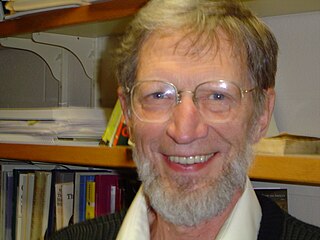Metaphysics is the branch of philosophy that studies the fundamental nature of reality. This includes the first principles of: being or existence, identity, change, space and time, cause and effect, necessity, actuality, and possibility.
An ontological commitment of a language is one or more objects postulated to exist by that language. The 'existence' referred to need not be 'real', but exist only in a universe of discourse. As an example, legal systems use vocabulary referring to 'legal persons' that are collective entities that have rights. One says the legal doctrine has an ontological commitment to non-singular individuals.

Alvin Carl Plantinga is an American analytic philosopher who works primarily in the fields of philosophy of religion, epistemology, and logic.
Analytic philosophy is a branch of philosophy using analysis, popular in the Western world and particularly the Anglosphere, which began around the turn of the 20th century in the contemporary era in the United Kingdom, United States, Canada, Australia, New Zealand, and Scandinavia, and continues today. Analytic philosophy is often contrasted with continental philosophy, coined as a catch-all term for other methods, prominent in Europe.
Christian philosophy includes all philosophy carried out by Christians, or in relation to the religion of Christianity. Christian philosophy emerged with the aim of reconciling science and faith, starting from natural rational explanations with the help of Christian revelation. Several thinkers such as Origen of Alexandria and Augustine believed that there was a harmonious relationship between science and faith, others such as Tertullian claimed that there was contradiction and others tried to differentiate them.
Peter van Inwagen is an American analytic philosopher and the John Cardinal O'Hara Professor of Philosophy at the University of Notre Dame. He is also a research professor of philosophy at Duke University each spring. He previously taught at Syracuse University, earning his PhD from the University of Rochester in 1969 under the direction of Richard Taylor. Van Inwagen is one of the leading figures in contemporary metaphysics, philosophy of religion, and philosophy of action. He was the president of the Society of Christian Philosophers from 2010 to 2013.

Robert Merrihew Adams is an American analytic philosopher, specializing in metaphysics, philosophy of religion, ethics, and the history of early modern philosophy.
In philosophy, mereological nihilism is the metaphysical thesis that there are no objects with proper parts. Equivalently, mereological nihilism says that mereological simples, or objects without any proper parts, are the only material objects that exist. Mereological nihilism is distinct from ordinary nihilism insofar as ordinary nihilism typically focuses on the nonexistence of common metaphysical assumptions such as ethical truths and objective meaning, rather than the nonexistence of composite objects.
Trenton Merricks is an American philosopher and the Commonwealth Professor of Philosophy at the University of Virginia. While Merricks' primary field of study is metaphysics, he has also published scholarship in epistemology, philosophy of language, and philosophy of religion.
John Patrick Hawthorne is an English philosopher, currently serving as Professor of Philosophy at the Australian Catholic University in Melbourne, and Professor of Philosophy at the University of Southern California. He is recognized as a leading contemporary contributor to metaphysics and epistemology.
Metaontology or meta-ontology is the study of the field of inquiry known as ontology. The goal of meta-ontology is to clarify what ontology is about and how to interpret the meaning of ontological claims. Different meta-ontological theories disagree on what the goal of ontology is and whether a given issue or theory lies within the scope of ontology. There is no universal agreement whether meta-ontology is a separate field of inquiry besides ontology or whether it is just one branch of ontology.
Graham John Ward is an English theologian and Anglican priest who has been Regius Professor of Divinity at the University of Oxford since 2012.
Brian Leftow is an American philosopher specializing in philosophy of religion, medieval philosophy, and metaphysics. He is the William P. Alston Professor for the Philosophy of Religion at Rutgers University. Previously, he held the Nolloth Chair of the Philosophy of the Christian Religion at Oriel College, Oxford, succeeding Richard Swinburne.
In mereology, an area of philosophical logic, the term gunk applies to any whole whose parts all have further proper parts. That is, a gunky object is not made of indivisible atoms or simples. Because parthood is transitive, any part of gunk is itself gunk.
Philip Clayton is an American philosopher of religion and philosopher of science. His work focuses on the intersection of science, ethics, and society. He currently holds the Ingraham Chair at Claremont School of Theology and serves as an affiliated faculty member at Claremont Graduate University. Clayton specializes in the philosophy of science, philosophy of biology, and philosophy of religion, as well as in comparative theology.

Tamar Szabó Gendler is an American philosopher. She is the Dean of the Faculty of Arts and Sciences at Yale as well as the Vincent J. Scully Professor of Philosophy and a Professor of Psychology and Cognitive Sciences at Yale University. Her academic research focuses on issues in philosophical psychology, epistemology, metaphysics, and areas related to philosophical methodology.
Theodore "Ted" Sider is an American philosopher specializing in metaphysics and philosophy of language. He is Distinguished Professor of Philosophy at Rutgers University.
Alexander Robert Pruss is a Canadian philosopher and mathematician. He is currently a professor of philosophy and the co-director of graduate studies in philosophy at Baylor University in Waco, Texas.
Michael J. Loux is an American philosopher and George N. Shuster Professor of Philosophy Emeritus at the University of Notre Dame. He is known for his works on metaphysics.



